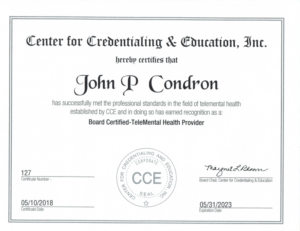 What is Teletherapy?
What is Teletherapy?
Teletherapy is a counseling approach that takes the best practices of traditional in-person counseling as well as some of its own unique advantages and adapts them for delivery to clients via electronic means in order to maximize the use of technology-assisted counseling techniques. The technology-assisted methods may include videoconferencing or stand-alone software programs, telecounseling (telephone), secure e-mail communication, chat, or other technologies.
How is Distance Counseling Different?
There are many differences between distance and traditional counseling. Distance counseling may be more convenient for clients and counselors. While video- or tele-counseling takes place in real time and does depend on “making an appointment,” traveling and related formalities do not present obstacles. Asynchronous (not happening at the same time) counseling communications via secure e-mail, chat, etc. adds even greater flexibility.
On the other hand, video- or tele-counseling and various forms of e-mail or synchronous chat techniques demand special counseling and communication skills from the counselor, and in some ways, from the client as well. It is important that the therapist have specialized training in distance counseling; though this is probably “the wave of the future,” it is not taught in counseling, social work or psychology programs! That is why I have sought extensive training in the delivery of teletherapy (see below).
Distance counseling may also present its own special advantages beyond the replication of best practices from traditional counseling. For example, some clients prefer the comparative anonymity provided by a distance counseling relationship and feel more free to open up and self-disclose than they might in an in-person counseling setting. We are also finding that the power of the written word in distance counseling provides a profound impact on both the counselor and the client.
Does Teletherapy Work?
Licensure and Registration
Ethical Standards
John Condron is Board Certified as a Counselor by the National Board for Certified Counselors (NBCC). As such, he is subject to the rules of the NBCC, which require that “NCCs shall provide only those services for which they are qualified by education and experience” and “shall also consider their qualifications to offer such service via distance means.”
As a licensee of the State of Idaho, John is also subject to the Code of Ethics of The American Counseling Association, which states that “Counselors actively attempt to understand the evolving nature of the profession with regard to distance counseling, technology, and social media and how such resources may be used to better serve their clients. Counselors strive to become knowledgeable about these resources. Counselors understand the additional concerns related to the use of distance counseling, technology, and social media and make every attempt to protect confidentiality and meet any legal and ethical requirements for the use of such resources.” The ACA continues “Counselors who engage in the use of distance counseling, technology, and/or social media develop knowledge and skills regarding related technical, ethical, and legal considerations (e.g., special certifications, additional course work).“
As a licensee of the State of Utah, John is subject to the Code of Ethics of The American Mental Health Counselors Association, which requires that “Counselors only provide distance counseling when they have had training, experience, and supervision to do so.”
Most professional associations state that therapists should provide only those services for which they have specific training and supervised experience. This is known as “scope of practice.” Telehealth services are no exception to this rule.
 Telebehavioral Health Certification
Telebehavioral Health Certification
John is proud to be only the 127th professional Board Certified as a Telemental Health Provider by the Center for Credentialing and Education, a nationally recognized affiliate of the National Board for Certified Counselors. This is currently the highest standard existing in the telemental health field.